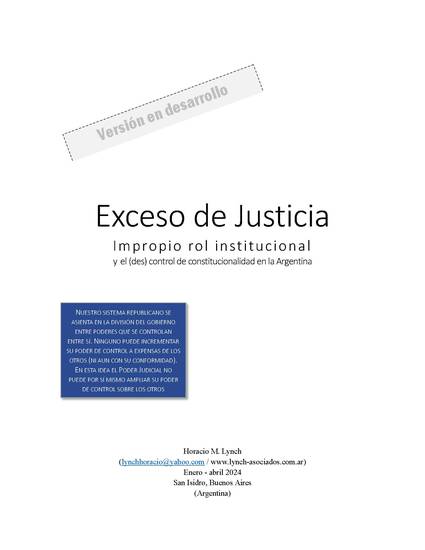
Unpublished Paper
PAPER-FINAL-ExcesoJusticia-Y-descontrolConstituc-V. 24Abr24.pdf
(2024)
Abstract
TOO MUCH JUSTICE - Improper institutional role and the (un)control of constitutionality in Argentina
ABSTRACT: I do not propose to limit the justice for which I have fought for fifty years, nor to enter into the deeper debate on judicial activism, juristocracy vs. democracy, mega-political trials, and the new constitutionalism, among others; but something simpler: I analyze the judicial review in Argentina, from its original version of the 19th century to the current much more incisive one, and I propose that it be kept within its limits, which is where it can be more effective, and gain respect. That is to say, I am trying to avoid the consolidation in Argentina of an unconstitutional situation of a Judicial Power intervening and reviewing almost instantly what the political powers do, as if it were on a par with them, co-governing. In Argentina we do not have a European-style Constitutional Court, but we are a federal country in the American style with a system of diffuse control by all the judges and that, although the cases end up in the Supreme Court, in the meantime they dictate preliminary injunction that suspend political decisions without time limit, and generate interventions and contradictory rulings that cause perplexity and uncertainty -the opposite of the certainty that is required to be imposed on Justice- and sometimes make it look ridiculous. I especially consider that our Justice and our Supreme Court are not well prepared, they are working badly, based on empirical studies and recent experiences. I notice something omitted as is the case of those who - contrary to those who question them - may agree with the measures but cannot give their opinion on the judicial process. In particular, I suggest the unconstitutionality of the reform of the remedy of amparo in the constitutional reform of 1994 and even in what could be an irregular extension of the control by the Supreme Court. I consider that this issue is not something exclusive to men of law, since it affects the good governance of the country and modifies the checks and balances that are the foundation of our republican system, and I invite experts from other disciplines to give their opinion. And I conclude by comparing with other countries and suggesting to review the issue in depth.
KEY WORDS: amparo trial, activism, constitutional control, government of judges, unconstitutionality, over-judicialization, juristocracy.
ABSTRACT: No propongo limitar a la justicia por la que he bregado durante cincuenta años, ni entrar en el debate más profundo sobre el activismo judicial, juristocracia vs. democracia, juicios mega-políticos, y el nuevo constitucionalismo, entre otros; sino algo más simple: analizo el control judicial de constitucionalidad en la Argentina, desde su versión original del s. XIX hasta la actual mucho más incisiva y propongo que se mantenga en sus límites, que es donde puede ser más eficaz, y ganar respeto. Es decir, intento evitar que se consolide en Argentina la situación inconstitucional de un Poder Judicial interviniendo y revisando casi al instante lo que hacen los poderes políticos, como si estuviera a la par de éstos, cogobernando. no tenemos en Argentina un Tribunal Constitucional a la europea sino somos un país federal a la norteamericana con un sistema de control difuso por todos los jueces y que, aunque los casos terminen en la Corte Suprema, entre tanto éstos dictan medidas cautelares que suspenden sin plazo las decisiones políticas, y generan intervenciones y fallos contradictorias que provocan perplejidad e incertidumbre -todo lo contrario a la certeza que se le requiere imponer a la Justicia- y en ocasiones la colocan en ridículo. Considero especialmente que nuestra Justicia y nuestra Corte Suprema no están bien preparados, están trabajando mal, con base en estudios empíricos y experiencias recientes. Advierto algo no contemplado como es el caso de quienes -al contrario de los que las cuestionan- pudieran estar de acuerdo con las medidas pero que no pueden opinar el proceso judicial. En especial sugiero la inconstitucionalidad la reforma del recurso de amparo en el reforma constitucional de 1994 y aún en lo que podría ser una irregular ampliación del control por parte de la Corte Suprema. Considero que tema no es algo privativo de los hombres de derecho, pues afecta el buen gobierno del país al modificar los check & balances que son el cimiento de nuestro sistema republicano e invito a opinar expertos de otras disciplinas. Concluyo comparando con otros países, y sugiriendo revisar el tema a fondo.
PALABRAS CLAVE: amparo, activismo, control de constitucional, gobierno de los jueces, inconstitucionalidad, sobrejudicialización , juristocracia.
Keywords
- amparo trial,
- activism,
- constitutional control,
- government of judges,
- unconstitutionality,
- over-judicialization,
- juristocracy.,
- amparo,
- activismo,
- control de constitucional,
- gobierno de los jueces,
- inconstitucionalidad,
- sobrejudicialización,
- juristocracia
Disciplines
Publication Date
April, 2024
Citation Information
Horacio M. LYNCH. "PAPER-FINAL-ExcesoJusticia-Y-descontrolConstituc-V. 24Abr24.pdf" (2024) Available at: http://works.bepress.com/horacio_m_lynch/45/
